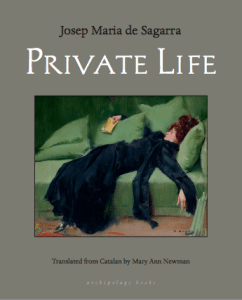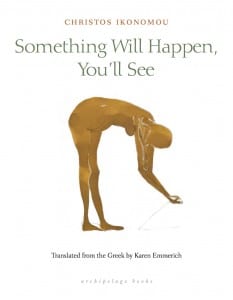
Catalan Fiction
by ADRIAN NATHAN WEST
Josep Maria de Sagarra
PRIVATE LIFE
Translated by Mary Ann Newman
240pp. Archipelago. Paperback, €16.
978 0 914671 26 8
From the mid-nineteenth century to the eve of the Civil War, which smothered what vanguardist tendencies Spain might have had, Continental innovations in literary form arrived to the country late. At worst, this gave rise to writers labouring in Zola’s shadow, forcing crude notions of class conflict and heredity onto tales peopled with stereotypes incomprehensible beyond the country’s borders; at best, it engendered a decadent, languid style well suited to the dissection of Spain’s venal elites. Josep Maria de Sagarra’s Private Life is in the second category.
A chronicle of the economic and moral decline of Catalonia’s aristocracy, the novel opens with Frederic, a drunken would-be rake, coming to in the apartment of a prostitute. He ruminates on love and gentlemanliness before recollecting his onerous gambling debts, due to be paid in a matter of days. Too poor for a life of leisure but too proud to soil his hands with work, Frederic appeals to his father, who lambasts him as a wastrel, then feigns an apoplectic fit and calls for a priest to minister his last rites. Frederic’s brother, secretly a prostitute in a brothel for the rich and dissolute, offers to pay off the debt by means he refuses to disclose. His scheme to blackmail Frederic’s creditor unleashes myriad intrigues that draw in Barcelonans from all walks of life.
The large cast of characters offers an ideal canvas for Sagarra’s withering wit. Everyone gets it in the neck: the upper classes, for whom “baseness” is a part of their “merit and grace”; the bourgeoisie enraptured by garden parties and Hispano-Suizas; and the communists, whose revolutionary fervour springs from soured religious yearnings, which, in turn, are the outgrowth of stifled sexual urges.
Private Life’s centrepiece is the 1929 Universal Exposition, when “anyone who didn’t steal simply didn’t have fingers”, and the proclamation of the Catalan Republic a couple of years later. The book’s second half is less convincing than its first; what had been a satire on manners becomes a racier, but also more mechanical, account of prurient liaisons larded with sometimes dreary philosophical divagations. Sagarra shoehorns his anecdotes into an overarching thesis about the centrality of sexual passion to social life. Thankfully, his homilies are brief, and shadow neither his ribald asides, nor his indictment of the frivolity and “mobile indifference” of Catalonia’s wealthy on the eve of the Fascist uprising.
TLS, May 13, 2016




